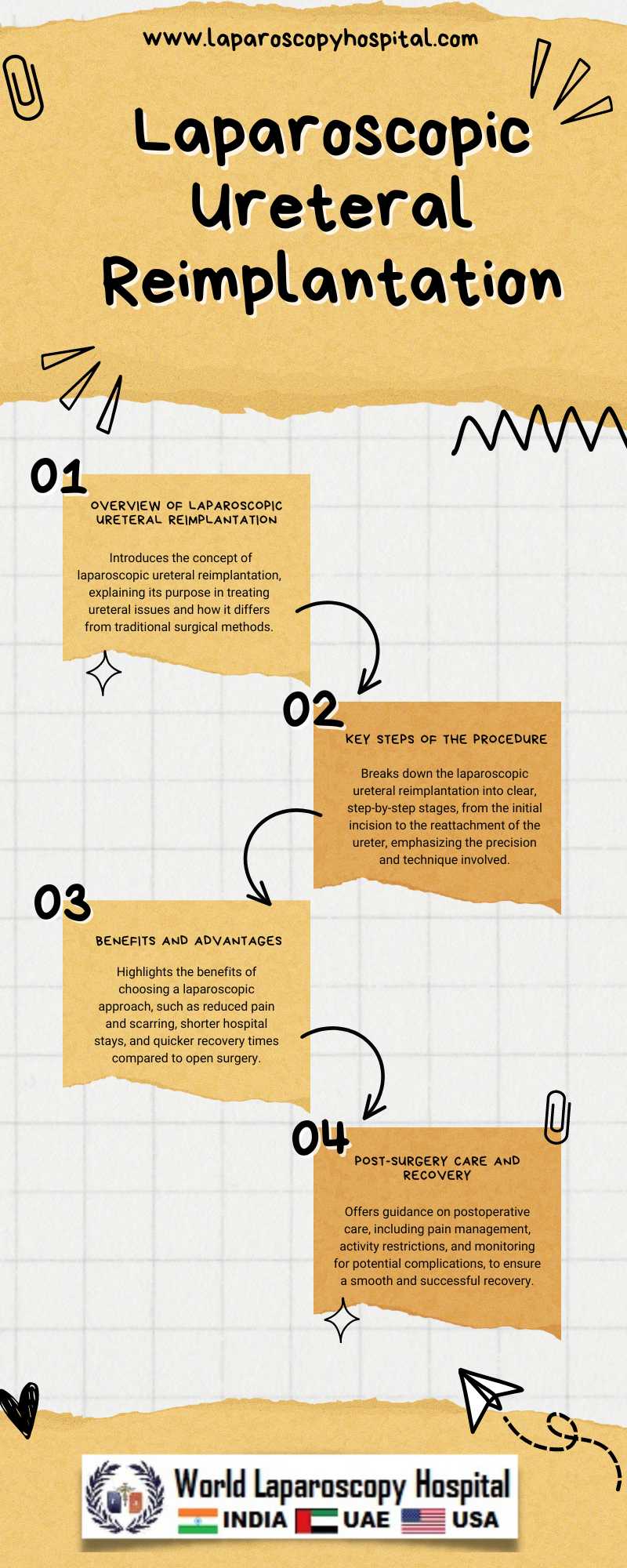Laparoscopic Ureteral Reimplantation: Advancements in Minimally Invasive Urological Surgery
Laparoscopic Ureteral Reimplantation: Advancements in Minimally Invasive Urological Surgery
Ureteral reimplantation, a surgical procedure traditionally done via open surgery to address issues like ureteral obstruction or vesicoureteral reflux, has evolved significantly with the advent of minimally invasive techniques. Laparoscopic ureteral reimplantation represents a groundbreaking advancement in this field, offering patients reduced pain, shorter hospital stays, and quicker recovery times.

The evolution of laparoscopic techniques in urological surgery has been a game-changer. Initially, these procedures were viewed with skepticism due to concerns about their efficacy and safety. However, over the years, with technological advancements and the accumulation of surgical expertise, laparoscopic ureteral reimplantation has not only become feasible but often preferred.
One of the most significant benefits of this approach is the minimal invasiveness compared to traditional open surgery. By using small incisions and specialized instruments, surgeons can perform the reimplantation with more precision and less trauma to the patient's body. This approach results in less postoperative pain, lower risk of infections, and faster healing, translating into shorter hospital stays and quicker return to normal activities.
Moreover, laparoscopic surgery provides surgeons with enhanced visualization of the surgical field. The use of high-definition cameras and monitors gives a clear and magnified view of the ureter and surrounding structures, allowing for precise dissection and suturing. This precision is particularly beneficial in complex cases where the anatomy may be distorted or when working in tight spaces.
The technological advancements in laparoscopic equipment have been pivotal. Instruments have become more refined, allowing for more delicate and precise maneuvers. Robot-assisted laparoscopic ureteral reimplantation is another significant advancement. Robotic systems provide surgeons with superior dexterity and control, further enhancing the precision of the procedure.
Training and skill development in laparoscopic ureteral reimplantation are essential. As with any advanced surgical technique, there is a learning curve. Surgeons need to undergo specialized training and accumulate experience to perform these procedures effectively. Fortunately, with the increasing prevalence of laparoscopic procedures, training opportunities have become more widely available.
Patient selection is crucial for the success of laparoscopic ureteral reimplantation. While it offers numerous benefits, it may not be suitable for all patients. Factors like the patient's overall health, the complexity of the ureteral issue, and previous abdominal surgeries are considered when determining the appropriateness of this approach.
Conclusion:
Laparoscopic ureteral reimplantation is a significant advancement in minimally invasive urological surgery. It offers numerous benefits over traditional open surgery, including reduced pain, quicker recovery, and minimal scarring. As technology continues to advance and surgeons become more skilled in these techniques, it's likely that the use of laparoscopic ureteral reimplantation will continue to grow, offering improved outcomes for patients with ureteral issues.
Ureteral reimplantation, a surgical procedure traditionally done via open surgery to address issues like ureteral obstruction or vesicoureteral reflux, has evolved significantly with the advent of minimally invasive techniques. Laparoscopic ureteral reimplantation represents a groundbreaking advancement in this field, offering patients reduced pain, shorter hospital stays, and quicker recovery times.

The evolution of laparoscopic techniques in urological surgery has been a game-changer. Initially, these procedures were viewed with skepticism due to concerns about their efficacy and safety. However, over the years, with technological advancements and the accumulation of surgical expertise, laparoscopic ureteral reimplantation has not only become feasible but often preferred.
One of the most significant benefits of this approach is the minimal invasiveness compared to traditional open surgery. By using small incisions and specialized instruments, surgeons can perform the reimplantation with more precision and less trauma to the patient's body. This approach results in less postoperative pain, lower risk of infections, and faster healing, translating into shorter hospital stays and quicker return to normal activities.
Moreover, laparoscopic surgery provides surgeons with enhanced visualization of the surgical field. The use of high-definition cameras and monitors gives a clear and magnified view of the ureter and surrounding structures, allowing for precise dissection and suturing. This precision is particularly beneficial in complex cases where the anatomy may be distorted or when working in tight spaces.
The technological advancements in laparoscopic equipment have been pivotal. Instruments have become more refined, allowing for more delicate and precise maneuvers. Robot-assisted laparoscopic ureteral reimplantation is another significant advancement. Robotic systems provide surgeons with superior dexterity and control, further enhancing the precision of the procedure.
Training and skill development in laparoscopic ureteral reimplantation are essential. As with any advanced surgical technique, there is a learning curve. Surgeons need to undergo specialized training and accumulate experience to perform these procedures effectively. Fortunately, with the increasing prevalence of laparoscopic procedures, training opportunities have become more widely available.
Patient selection is crucial for the success of laparoscopic ureteral reimplantation. While it offers numerous benefits, it may not be suitable for all patients. Factors like the patient's overall health, the complexity of the ureteral issue, and previous abdominal surgeries are considered when determining the appropriateness of this approach.
Conclusion:
Laparoscopic ureteral reimplantation is a significant advancement in minimally invasive urological surgery. It offers numerous benefits over traditional open surgery, including reduced pain, quicker recovery, and minimal scarring. As technology continues to advance and surgeons become more skilled in these techniques, it's likely that the use of laparoscopic ureteral reimplantation will continue to grow, offering improved outcomes for patients with ureteral issues.
No comments posted...
| Older Post | Home | Newer Post |





